AMBER WHITAKER

My name is Amber Whitaker. I am 34 years old and live in Cincinnati, Ohio. Three years ago I tested positive for the BRCA2 genetic mutation. This means I have a greatly increased risk for breast and ovarian cancer. I have learned that it is hereditary and my three daughters have a 50 percent chance of carrying this gene mutation as well. I have also learned that there is a patent on my genes. MY genes. My daughters' genes.
I have been recommended by my doctors to seriously consider having an oophorectomy and double mastectomy (this means removing my ovaries and breasts) in order to decrease my cancer risk. These are major, life-changing surgeries. Certainly I would like to have a second opinion on my test to be absolutely sure that this is the route I need to consider. I would like to know that every researcher, doctor, and geneticist possible is out there learning more about these genes. But I can't. A company, Myriad Genetics, holds a patent on my genes.
One day, my daughters will have to make the decision to be tested. I want to know that they have every resource available to them--that they can afford the test and have all the information needed in order to make an educated decision about their own bodies. I want to know that in the years leading up to that point, everything possible is being done to learn more about these genetic mutations. I want to know they will have ownership of their genes. So on behalf of myself, my daughters, and the many other patients out there dealing with this same issue, I am taking back MY genes. I am taking back my daughters' genes.
Stand with me.
ANDREA QUINTERO

Patents should not stand in the way of medical research and life-saving health care.
As someone of Latino ancestry whose BRCA mutations may be more likely to be missed by Myriad's "comprehensive" BRCAnalysis, as a woman with a history of breast cancer in her family, and as someone that believes that the medical industry should serve people before profits, I take back my genes.
Stand with me.
ANDREA ZILTZER

It's extremely upsetting that extensive research cannot be conducted on BRCA genes because they are "owned" by a company unwilling to share.
Stand with me.
BECKY WOODS

I am BRCA2 positive. I have several family members who need to be tested but cannot afford it. It would be nice to have testing made more affordable for everyone.
Stand with me.
CAITLIN CARMODY
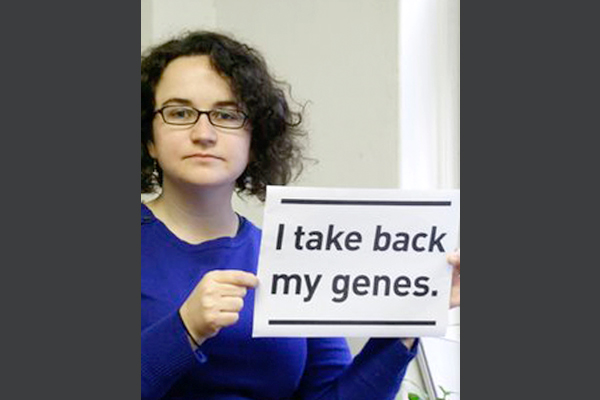
When I underwent genetic testing, seeking to know whether I carry a genetic mutation that puts me at an increased risk of cancer, I was dismayed to learn that a part of my body is patented. I am outraged that many women cannot afford to get those answers, or cannot get a second opinion, thanks to Myriad's patent on our genes.
I am outraged that 80 percent of Myriad's profits come from a patent on information about our own bodies. I am outraged that a court granted a corporation ownership over a part of my body. For me, and for all the women and men who deserve access to information about their bodies, and for all the researchers who could do so much good if it weren't for this patent, I take back my genes.
Stand with me.
CATHY (in Boston)
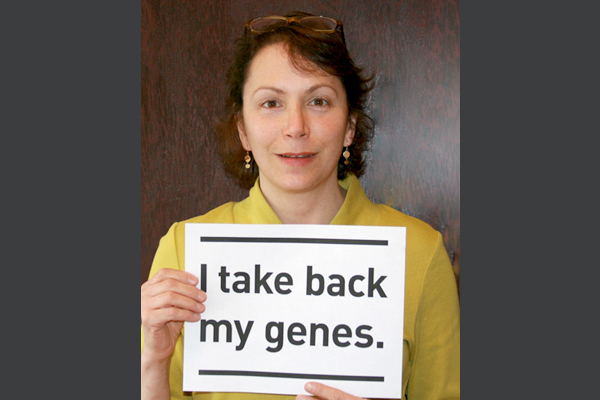
In high school biology, back in the 1970s -- the Dark Ages -- I remember reading about the effects of radiation on human populations. "That's it!" I thought. "My ancestors must've grown up on a uranium dump!" How else to explain all the cancer? Doctors told me my family was unlucky, that the awful diagnoses and outcomes were the results of "unfortunate coincidences." It wasn't until I was the mother of three in the 1990s that I learned there was a much simpler explanation: a BRCA mutation, which I carry.
Many families live under the shadow of similarly inexplicable "unfortunate coincidences." As researchers continue to untangle the mysteries of DNA, they will provide more of these simple explanations. To allow centuries of out-of-date patent law and corporate greed to stand in the way of a search for causes and practical cures makes even less sense than my adolescent fantasy of my family's origins. I won't let Myriad Genetics stifle research into causes and cures. Stand with me and declare: "I take back my genes!"
Stand with me.
CHARITE RICKER
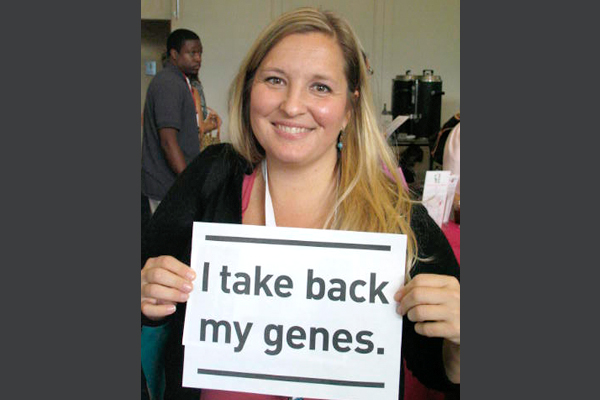
As a genetic counselor who works with uninsured and underserved populations, I am frustrated with Medicaid programs' lack of coverage for BRCA gene testing, and the prohibitive costs of testing. I think the patents lead to unreasonably high costs of testing for the BRCA genes that are disproportionate to actual laboratory costs of the analysis.
Stand with me.
CHRISTINE KOBELKA
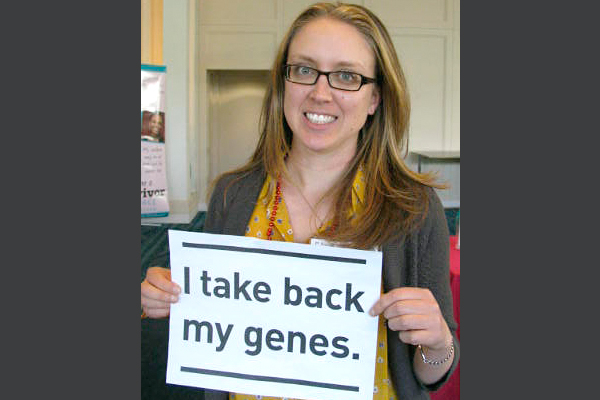
Patents limit access to testing for the BRCA genes and drive up the cost of testing.
Stand with me.
CYNTHIA BURNSON
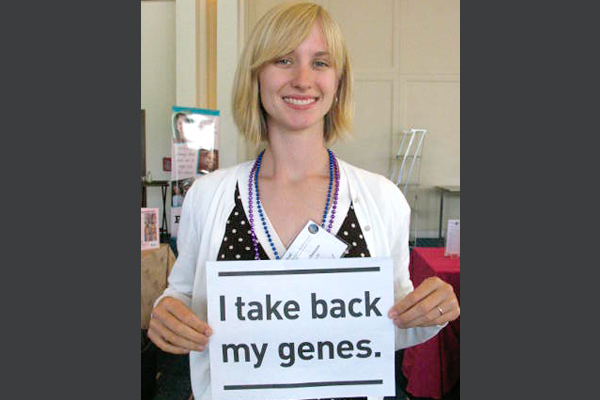
Gene patenting has made it prohibitively expensive for my loved ones to get tested. Getting tested can save people's lives, and making testing unfeasible can cost them their lives.
Stand with me.
DANIELLE BONADIES
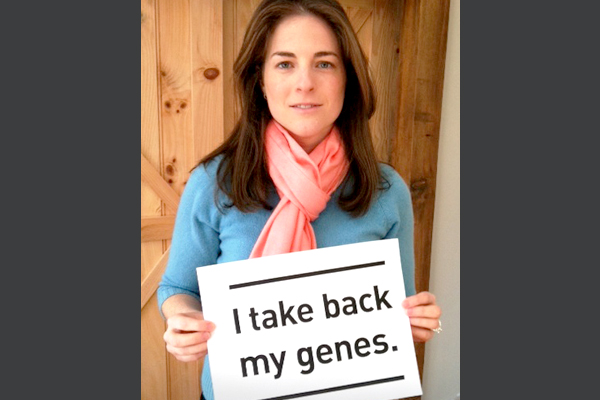
I provide genetic counseling to individuals and their families at risk for hereditary types of cancer. Myriad's patents on the BRCA1 and BRCA2 genes have negatively impacted clinical care, research and advances in the field of hereditary breast and ovarian cancer. Their "Comprehensive BRACAnalysis" may miss up to ~10 percent of BRCA mutations because they have resisted incorporating newer technology into their "comprehensive" test. This rate may be higher in those of Hispanic ancestry. The vast majority of my patients who need BRCA testing cannot afford to pay out-of-pocket for this extra test. We are missing mutations because access to testing is financially prohibitive � a result of Myriad's patents.
I take back my genes. I take them back for me, for future generations and for men and women who desperately need this information now. Our genes, our bodies, should not be patented, should not be subject to corporate monopoly and should not be profited from.
Stand with me.
EDWARD LOECHLER

I want researchers to have access to genetic information that will save lives.
Stand with me.
ELIZABETH JURENOVICH, MS, LCPAA, LPC, LMFT

At the age of 38, having had a malignancy found in the course of my first-ever mammogram, I was referred for genetic testing, through Myriad. I was stunned to learn that I was BRCA1+. I was pregnant with my first child at the time, and had no idea how this diagnosis would impact my body, my family and my future. It was a very scary time in my life.
Yet it wasn't until today that I learned that Myriad has been profiting off my genetic misfortune, and that of others who share my fate. I didn't even realize our government had granted some big biomedical corporation the right to hold a patent on my genes, and that's scary in a whole different way. I didn't realize how cost-prohibitive Myriad's BRCA testing has become for those who are not fortunate to have the means that I did. And I didn't know that Myriad had a monopoly on the genetic research market. That's just not right, considering how much BRCA has cost us, already! Nobody but God should have the right to hold a patent on any person's genes.
I am very thankful that the ACLU has taken on this cause, and I join in calling for a halt to human gene patenting. On behalf of myself, my children and my late mother, who conquered breast cancer but succumbed to ovarian cancer, I take back my genes! And I beg you...
Stand with me.
ELLEN T. MATLOFF
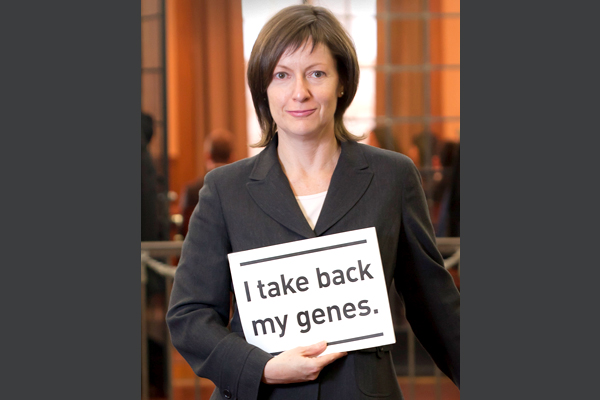
"Hereditary breast and ovarian cancer has become big business."
In 1998, BRCA1 and BRCA2 testing cost US$1600 in academic laboratories and rapid improvements in technology promised to drive costs down. But then Myriad Genetics began to enforce their patents and everything changed. Academic laboratories were forced to close their clinical operations. Although the cost of sequencing dropped exponentially from $1 to a tenth of a cent per base, the cost of BRCA testing rose to $3,340 in a decade. Later, the company added BART testing (their trademarked BRACAnalysis rearrangement test) for an additional $650 (now $700), which most insurance companies will not cover. Thus most patients walk out the door without having all of the necessary and available testing unless they are prepared to pay for it themselves.
Hereditary breast and ovarian cancer has become big business.
I take back my genes. I, along with hundreds of others support the efforts of the ACLU and the Public Patent Foundation to challenge the patenting of human genes to end gene patenting.
Stand with me.
ERIN W. HOFSTATTER, MD

I am a breast oncologist at Yale Cancer Center with expertise in patients at high risk to develop breast cancer. BRCA testing can make all the difference for my patients in being able to prevent cancer in themselves and in family members. However, I too often see patients for whom money and a patent stand in the way of their recommended BRCA testing. As a cancer clinician and researcher, I believe that Myriad's patent for BRCA 1/2 directly impedes my ability to care for my patients and to study new ways to treat and prevent breast cancer. Gene testing must be made available to all patients if we are to continue to make progress in our fight against cancer.
I take back my genes. I take back my patients' genes.
Stand with me.
ERNESTINE KUHR

Take back our genes!
Stand with me.
GAYE HYRE

I am a breast cancer survivor. Because of my ethnic background, I needed to know what my BRCA status was. It meant the difference between a lumpectomy and having to have a bi-lateral mastectomy and a complete hysterectomy. No one should have to take that risk, or make that decision uninformed.
I and my sister survivors, are outraged that any third party could be granted total rights to a piece of our own bodies. We are deeply offended that we cannot give our own tissue for research to help prevent others from suffering with this disease. If this patent is upheld, and this practice becomes standard business procedure, what is to keep our bodies from becoming the next commercial gold rush? Could we be charged royalties for possessing certain, or for that matter any, characteristics?
The breast cancer patients, survivors, and supporters of ArtBra New Haven take back our genes!
Stand with me.
GHESEMY LOPEZ
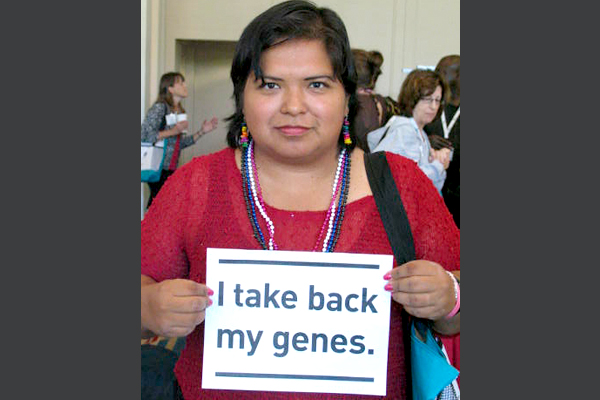
As a BRCA1 carrier, my family and I have had to face the expensive costs of genetic testing created by this monopoly.
Stand with me.
HARRY OSTRER, MD

"In breast cancer genetic testing we have seen no innovation in the past 14 years � since Myriad Genetics introduced its most recent test."
I am professor of pathology and of genetics at Albert Einstein College of Medicine and director of genetic and genomic testing at Montefiore Medical Center in New York. Until recently, I oversaw the genetic risk assessment program at the New York University Langone Medical Center (NYULMC) as well as New York's Bellevue Hospital, two medical centers which serve very different populations. At NYULMC, we send the genetic samples of hundreds of women and men each year to Myriad to be tested for the BRCA mutations. Yet at Bellevue, in the very same city, we sent the genetic samples of only 64 high risk women to Myriad in a four-year period. This is because many of the patients at Bellevue don't have health insurance and they can't afford the high price Myriad charges for the testing.
Every day I think about how the findings of the research laboratory can be translated into new genetic tests that might benefit, not harm, people. Gene patents present significant hurdles to my work.
On behalf of my patients, and the hundreds of women I have worked with to identify other genes that influence peoples' risk of developing cancer, I take back my genes.
Stand with me.
JANE HERMAN

We need research and options, not patents that stifle these things.
Stand with me.
JENNY ERDMAN
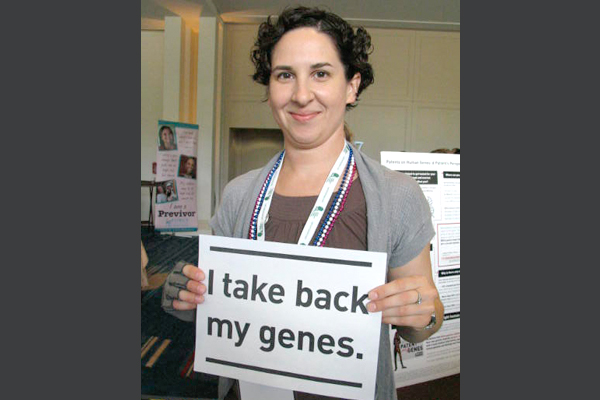
Gene patenting has made it more challenging for my family to consider genetic testing since we don't have insurance.
Stand with me.
KAREN MILROD

Patenting the BRCA1 and 2 genes can only hurt research efforts in the genetic cancer arena.
Stand with me.
KATE BERGES
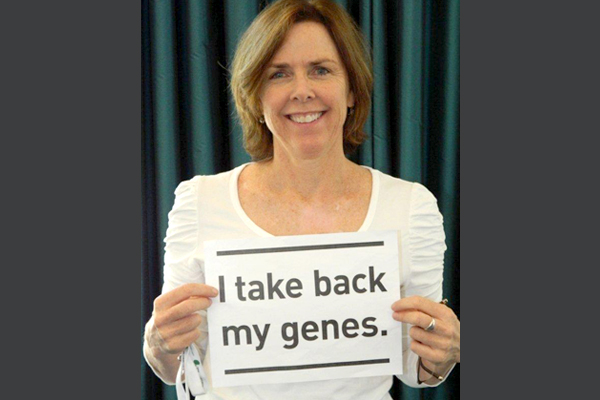
These patents are holding up life-saving, life-altering research for current & future generations!
Stand with me.
KATHLEEN CORDERO

The cost of genetic testing is too high and the patents are holding back research. If you own the patent on my genes, you should own my medical bills as well.
Stand with me.
KRISTEN BARKER

I believe these patents are unconstitutional and negligent! They're preventing life-saving research and progress in the field of hereditary breast and ovarian cancer.
Stand with me.
LINDA PLAUT
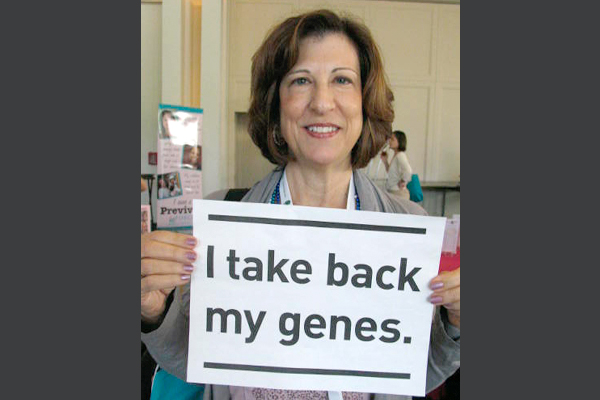
Human gene patenting and the patents on the BRCA1 and BRCA2 genes should not be allowed.
Stand with me.
LINDSAY AND GROUP

We are genetic counselors at Beaumont Health System in Southeast Michigan. Together we have worked with hundreds of families at risk for Hereditary Breast and Ovarian Cancer syndrome caused by BRCA1/2 mutations. We have patients that have not been able to undergo testing due to lack of insurance coverage and high out of pocket costs that are driven by Myriad Genetic Laboratories' patent leading to rising testing costs. We have counseled patients who have had test results misinterpreted, received inappropriate testing, and experienced inadequate counseling due to the extensive direct to consumer marketing campaign that has been created to increase the financial profit due to the BRCA gene patent. Genetic counselors are advocates for their patients, and the BRCA patent limits our ability to advocate at a clinical and research level. On behalf of all of our patients and their families, we take back our genes.
Stand with me.
LORI CHATTEN

Gene patenting should not be allowed to continue. It's a monopoly on science!
Stand with me.
MARK PENZEL
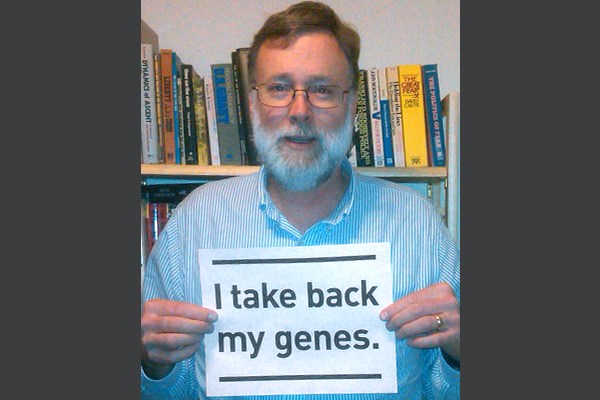
No company should have the power to patent my or anyone else's genetic code. No company should be able to prevent research on my or anyone else's genes. I should retain the right to make that decision regarding my health myself. I urge the Supreme Court to accept the cert. petition in the Myriad case and reverse the decision of the Federal Circuit Court of Appeals.
Stand with me.
NICOLE ROSE LAND
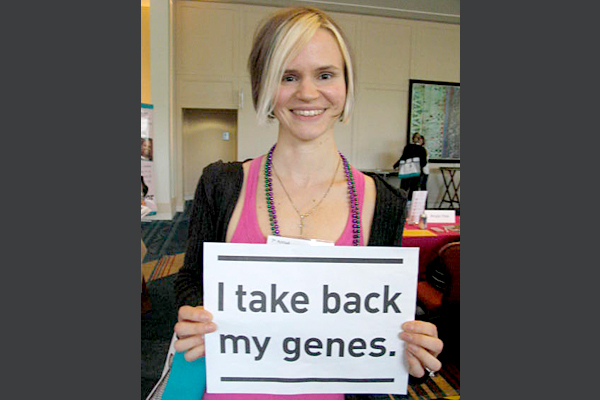
My family carries a BRCA1 mutation of unknown significance and I want to be sure that further research on these genes is not impeded.
Stand with me.
REGINA CARDENAS
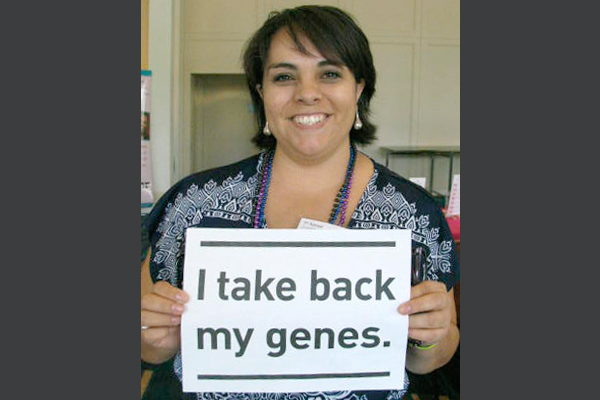
The patents inhibit research and healthcare! Take back your genes!
Stand with me.
RUNI LIMARY

"I want to be able to make an educated decision before I undergo such a serious and life changing surgery."
My name is Runi Limary. I am 34-year-old, Asian-American living in Austin, Texas. When I was diagnosed with breast cancer, I was only 28. I took the BRCA test to learn about whether I was at high risk for ovarian cancer, but my results were ambiguous. They showed that my BRCA genes had a "variant of uncertain significance," indicating that I have a mutation that may or may not mean a higher risk of cancer. I was told that the variant in my genes has been seen in Asian women, and I later learned that these ambiguous results seem to come up more often for minority women.
I will have to make a decision about whether or not to have an oophorectomy (removal of the ovaries). I'm only 34 and don't have children. I want to be able to make an educated decision before I undergo such a serious and life changing surgery.
Gene patents give the patent holder control over data about our genes whether other scientists can perform research to find out the meaning of different mutations. We need to make sure other researchers are free to study unknown mutations like mine. The way it is now, I and other patients have to depend on the decisions made by a single company.
Today, I take back my genes. I, along with organizations of medical professionals, geneticists, breast cancer and women's health groups and patients impacted by the monopoly on the BRCA genes, represented by the ACLU and PubPat, are willing to go all the way to the Supreme Court to end gene patenting.
Stand with me.
SAHRU KEISER

I am a 36-year-old woman working for an organization that advocates for ending the breast cancer epidemic. I work on our priority of eliminating social inequities related to breast cancer through education and mobilization. Myriad Genetics patents on the human genes BRCA-1 and BRCA-2 not only hinders progress in understanding the links between genetics and cancer but reduces the options for families seeking to obtain vital information about their own DNA, health, and safety. For those who can afford it, at $3,000 for genetic testing, Myriad Genetics will test for the mutation. For those who cannot afford it, women are denied access to a powerful tool that would greatly affect decisions surrounding her health and safety. I take back my genes because refusing a woman details about her own body � details that would inform necessary and life-changing medical decisions � based on her inability to pay, is a whole lot more controversial, I think, than the desire of the biotechnology industry to guarantee profitable return for their investments.
Stand with me.
SIVAN SCHONDORF

No one should be able control our genetic information. It's our right to know!
Stand with me.
STRECKER
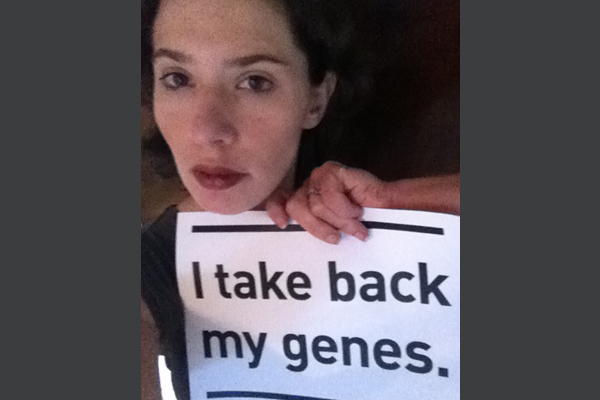
It's time to stand up for what is right.
Stand with me.
SUE FRIEDMAN
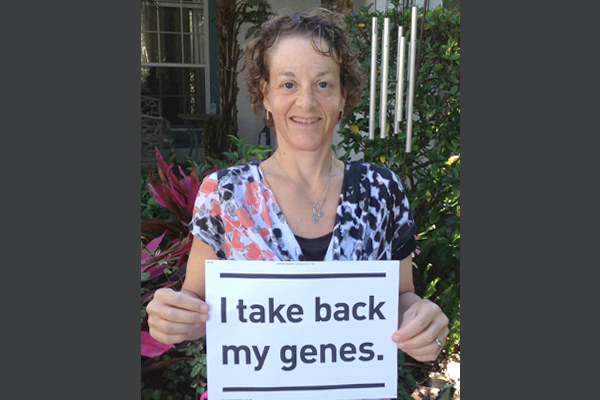
I am founder and Executive Director of the international organization Facing Our Risk of Cancer Empowered (FORCE). FORCE is devoted to improving the lives of people and families affected by hereditary breast and ovarian cancer. As an advocate for the hereditary cancer community and as a woman with a BRCA2 mutation, I am outraged that gene patenting has led to negative consequences for hereditary cancer research, access to care, interpretation of test results, and quality-of-care.
I, and the organization FORCE support the ACLU's efforts to challenge the patent on the BRCA genes.
Stand with me.
TAMMI AND CHAD REEVES
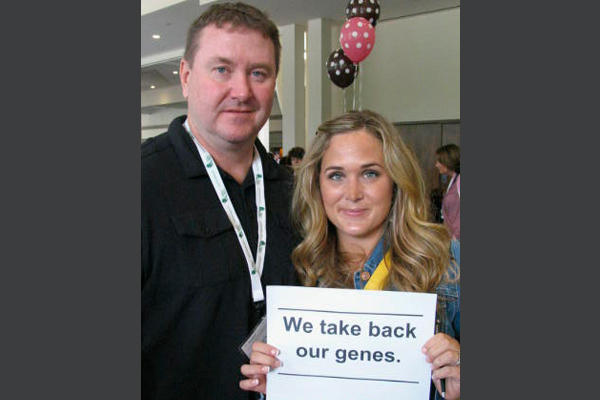
Gene patenting limits our freedom to conduct research and make healthcare decisions. These are our genes, our decisions, our rights!
Stand with me.
WENDY HOY
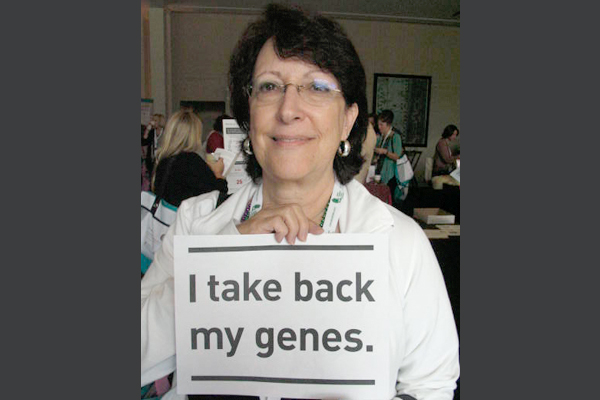
It is appalling that genes � natural components of our bodies � can be patented!
Stand with me.
WENDY UNGER
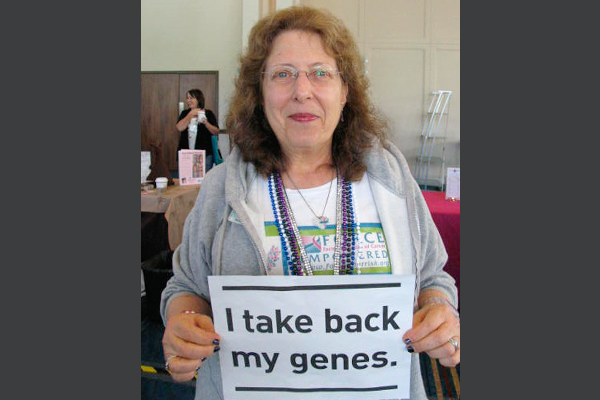
I'm BRCA1 positive � I own my genes � they don't.
Stand with me.
ZOE CHRISTOPHER

I work for a women's health advocacy and education organization, and as the Resource Liaison, I handle hundreds of calls and emails each year from women affected by breast cancer. I am deeply concerned about the lack of accessibility of services for women without insurance, women who are members of the working poor, women who cannot afford insurance, women of all ages representing marginalized communities. If they are diagnosed with particular types of breast cancer, many women are simply sent home to die � while pharmaceutical giants and corporations rake in billions of dollars in profits to treat more privileged women.
Until testing, screening, and treatment costs are within reach of everyone needing them, all of us will continue to pay the outrageous costs of breast cancer, even if we never receive the diagnosis. I take back my genes from Myriad Genetics so that profit will not be at the expense of women's lives � so that research and testing will be done with an eye to the public good � so that all women can have access to genetic testing � so that all women can have access to treatment and quality care.
Stand with me.